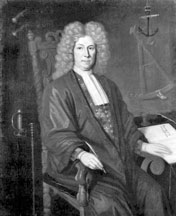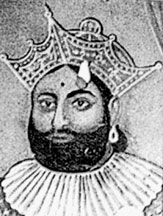How Robert Knox viewed King Rajasingha of Kandy
by Amal HEWAVISSENTI

Robert Knox |

King Rajasingha |
"His name is Rajasingha. Though the literal meaning is 'The King of
Lions' the King is not descended from the genuine royalty. This King's
queen is said to have a Malabar origin and strangely enough, within the
twenty years that I spent in Sri Lanka (Ceylon) I have not had the least
visual proof which made me believe that the king lived with her... The
king is short in stature, fat, rather dark with fully round belly but
his eyes are still penetrative, lively and are implicated in valiant,
uncompromising mood. The copper of his hair and his face, highly
embellished by the thinking grown beard, bear all the marks of life time
valour. But his idiosyncratic nature has clear manifestation that he is
ever young, both by action and by thinking pattern though he is around
eighty years of age".
The above is a fragment of profile given of King Rajasingha of Kandy
by Robert Knox who had a 20-year ordeal in captivity under Rajasingha
and launched, in 1681, his rather autobiographic, epic record of
thoughts, beliefs, customs of Sinhala people and the mechanism of
Sinhala Kingship. His total attitude towards the King and Sinhala people
was an absolute blend of imperial bias, cynical criticism, logic and
truth simply because he had to live in captivity under the King. His
classic masterpiece "Historical Relation of the Island of Ceylon" is a
graphic representation of a people and the King though there are
problems of exaggerated reportings due to its confusion on the ship
where he composed it.
However, his account of the King and the royal factors around him
mirrors harsh cynicism with logical truth tempered by 20-year first hand
observations.
Royal food
"The King is used to take his meals quite formally with royal
orderliness. The whole dining table is covered with a white cloth. The
King sits on a short stool and eats food from an elaborate golden bowl
placed on a bluish green plantation leaf, spread on the table.
Throughout the table are plates and bowls filled with around 40 types of
curries and dishes.
The "Bath Wadana Nilame" (rice-serving officer) who has covered his
mouth round with a cloth, is always at work serving what the King likes
from the plates in to the Kings golden bowl.
The fresh greens and fruits growing lushly in the royal gardens are
his favourite and he eats them once a day with extra special relish.
Whatever type of food that is for the King, must be brought respectfully
covered with a white cloth.
Even the royal kitchen is very special and it maintains an awe
inspiring formality. Preparation of the Kings food was assigned to most
beautiful ladies brought to the palace from all corners of the country.
I remember once there were pretty, Portuguese ladies serving in the
kitchen and even now there are some of them. Whether they are married or
not, they have to perform their duties in the kitchen as long as they
live, with no hope whatsoever of redemption. Some ladies fled from the
royal kitchen and a poignant tragedy touched some other ladies who were
subject to the King's extreme anger and were sunk into deep water on the
King's orders.
The palace
The Kings Palace which is surrounded by a strong lime - plastered
rampart, is a complex of edifices with a number of elegantly carved
doors and a balcony with carved and painted wood fences. However, the
palace has been designed not only for the Kings enjoyment but likewise
for his protection against any hostile attack. It is really a mansion of
wood and attractive carvings.
A sentry is posted at every door of the palace and nobody is allowed
without the Kings permission to walk from one part of the palace to
another part. Apart from these there are some brawny and influential
sentinels with special privileges who have to be on strong guard of the
King particularly at night. They have been exclusively appointed by the
King but they are under no circumstances, allowed to talk together and
are not supposed to loosen the tight security for the King.
"To keep watch over the palace at night, even elephants are employed.
Should there be any rebellion, strife, or any type of conflict, those
responsible for it are rounded up and are made to be trampled by the
elephants. The bodyguards for the King are Negroes who are given a
special allowance. Sometimes the King employs specially trained spies to
collect and report secret information on the sentries who fail to do
their duty or sleep during the allocated time. In addition, these spies
eavesdrop what the sentries talk at night and report it to the King.
Sometimes, the King himself disguises himself and walks at night simply
to know the public opinion, ideas, and thoughts. The king's personal
guard involves children, youth and strong men from higher castes".
Attitude to miscreants
"When some royal guards happened to have some type of misconduct with
women the King took special care to punish them. Women who have been
involved is sexual misconduct with royal guards or any official in the
palace are outright dispelled from the city. Therefore women take
immense care to behave themselves as they know the brutal nature of
punishment that would come on them. Some prostitutes who accidentally
get caught to the royal guards will pay a fair price for what they have
done, at the hands of the King. Though the women aspire to leave house
disguised as men and behave as they wish at night, they are highly
alarmed by the possibility of being caught by guards and punished with
the most unspeakable tortures.
Knox sees envoys
Knox has excelled in the art of explorations not only by closely
scrutinising the lifestyle and cultural back drop of Sinhala people, but
also by mastering the Sinhala language in a way that he could have
written his book even in Sinhala language itself. It is generally
believed that Daniel Defoe too adopted Knox's work as an ideal archetype
and a prototype to create his novel "Robinson Crusoe" a century later.
Yet Defoe's work involves the elements of fantasy and imagination
when dealing with the experiences of a sailor marooned on an island
while Knox's work on the contrary deals with practical and realistic
experiences of prisoner in a new land (Ceylon). Knox's original work
translated itself simultaneously into French and Dutch - a clear proof
to show its unconditionally superlative position in English literature.
However, Robert Knox adopts a comparatively optimistic view point
over King Rajasingha when he reports how the King maintained the
diplomatic relations with other countries. Says Robert Knox, "The King
displays a penchant to welcome foreign diplomats. When they come,
specially arranged troop s march along a decorated royal street to
escort them to the palace.
As long as the diplomats are in the palace, they are treated as
exclusive royal guests and are granted every possible privilege,
facility and any other thing they wished on the King's order. The King
instructs the guards to provide tight security for the envoys and show
them the most captivating places in the country. In his way, a highly
amiable atmosphere between the King and the envoys are ensured during
their stay in the country.
Punishment
The King has evinced his brutality and dictatorship by imposing
punishment on the whole family of an offender. His approach to severe
punishment is killing the culprit bit by bit by subjecting him to
different stages of torture. Sometimes the culprit is made to confess
his guilt by burning his body with a hot iron or by cutting pieces of
flesh off his body. When this happens, even a guiltless man may confess
that he had committed the crime. The king sometimes orders the criminal
to eat his own flesh out of his limbs and once he ordered a guilty
mother to eat flesh out of her child. After hearing the cases, the king
orders the executioner to take the condemned criminals to the place of
torture and plant them on sharp stakes until the stakes pierce through
the criminals body. The hounds who cannot wait till the staked criminals
die, jump up and tearaway flesh from the criminals. Some criminals are
tied to trees and their limbs are cut off. This place of fortune is
situated on a higher elevation because everyone can witness how
criminals are punished and be careful not to commit any crime."
The moat around the "Magul Maduwa", somewhat away from the palace,
serves as a beautiful pond abundant in fish. Here there are some
mansions which contain varied exquisite carvings. The King is used to
feed the fish in the pond by offering them boiled rice on his palms. The
fish are so familiar with the King that they come to his palms in water
looking for food. The royal elephants bathe here. He has many rare
horses some of whom, he captured at war and some of whom he received
from the Dutch as gifts. Apart from horses, he is in possession of deer,
tigers, dogs and other animals. Marksmanship is one of the king's
favourite pastime. He has golden, carved guns, and some guns
appropriated from the Dutch stored on display in an armoury. He has
given a marked place for Dutch guns as a reminiscence of his military
victories against the foreign forces.
Swimmer
The king usually derives much pleasure by reviewing the curios and
other precious things in his personal collection. He is highly attracted
to swimming. When he goes to bathe, he swims with his guards and other
people for sport. He justly tolerated Christianity and respected it as a
religion."
In any case, Robert Knox's portrayal of the King and his nature was
amply influenced by negativity which resulted from his being in
captivity for as long as 20 years in Ceylon. But wherever necessary, the
writer graphically represented the King with a balanced outlook and
logical criticism that is truth oriented.
He admits that the Sinhala King is diplomatic, factful, and efficient
in administration and fastidious about everything that affected the
state and his subject. Knox gives mutually contrasting details of the
King as he labelled the king to be a person who was not prepared to
listen to sober counselling by any person and was bent on using power
without restraint. The careful critic or the reader is to have sound
judgement on what the writer says about the King and the country and why
he has developed the probably negative attitudes or concepts.
Finally, as a nation, we must be thankful to him for recording true
aspects of state and people of the Kandyan period because his work has
not been replaced by historical chronicles on the period. |

